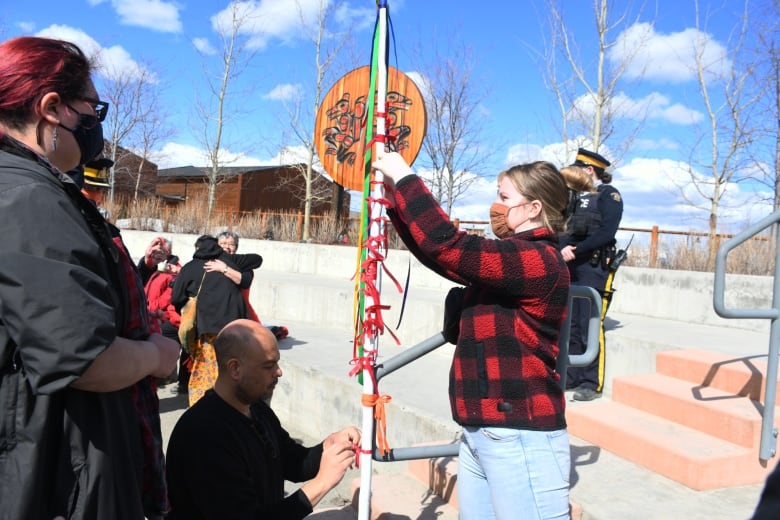Hundreds attend Whitehorse march honouring MMIWG2S+ on Red Dress Day
Participants marched from Whitehorse hospital to Kwanlin Dün Culture Centre

Michele Thompson never had the chance to meet her aunt, Barbara Jack.
Jack was 14 when she disappeared after running away from her foster home in Whitehorse, where she was also forced to attend residential school.
It was 1974.
Her remains were found on Grey Mountain a year later.
"She was really young when she went missing and I don't know if anyone looked for her … That's just sort of a heartbreaking story," Thompson said in an interview on May 5.
"She was only 14 years old … So that's why I walk, is because that was my aunt."

In memory of Jack, Thompson has organized a march in Whitehorse on Red Dress Day, also known as the National Day of Awareness for Missing and Murdered Indigenous Women and Girls, for two years in a row now.
While she described the 2021 march as "very informal," Thompson said she partnered with local groups including the Whitehorse Aboriginal Women's Circle and the Yukon Aboriginal Women's Council this year to formalize the event.
Accompanied by the sound of singers and drums, hundreds of people walked from Whitehorse General Hospital to the Kwanlin Dün Cultural Centre late Thursday morning, where a ceremonial fire was lit.
Hung on tree branches along part of the route were 42 red dresses, with 41 of them symbolizing Indigenous women and girls who have disappeared or have been murdered in the Yukon and northern British Columbia and the last dress representing future victims.

Thompson said she was "very honoured" and "extremely humbled" by the turnout for the march.
"People are now aware of MMIWG2S+ and we can speak about the murdered and missing women," she said.
"We're wanting justice. We want to see closure. We want to see resolution, we want reconciliation — we want all the things for our women, for our sisters, our mothers, our grandmothers, our nieces, our aunts, our daughters. We want all of that for them."

Whitehorse Aboriginal Women's Circle executive director Natalie Taylor also applauded the number of people who attended Thursday's march and ceremony.
"More and more people are getting knowledgeable about the (issue of) missing and murdered Indigenous women and 2-Spirited individuals and as a result, you know, they want to help, they want to be part of it, they want to bear witness," she said.
"They want to gather and learn and support the community, and so it's great."

In a speech following the lighting of the ceremonial fire, Jeanie McLean, the Yukon minister responsible for the Women and Gender Equity Directorate, emphasized that men and boys needed to be part of the conversation and solutions, too.
"You have an important role to play here — you are our ally, you are our protectors, you have a really specific role to play and I want to hold you up," she said.
"(I want you) to think about your daughters, your nieces, your wives, your aunties, all of the women in your life…Please know that you're part of this and that you are part of what we are doing in the Yukon and throughout Canada and setting the course for the rest of the world."
The Yukon, in 2020, became the first jurisdiction in Canada to release a strategy in response to the final report of the National Inquiry into Missing and Murdered Indigenous Women and Girls.
An accountability forum will be held on May 18 and 19 to provide a progress update.
